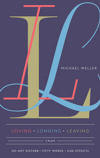Loving Longing Leaving
Lindy is married to Hugh. They live in the Midwest. Adam is married to Jan. They live in Brooklyn. Lindy and Adam have resumed their affair that began in Manhattan and ended when Hugh took over his family’s bicycle business. Jan and Hugh know what’s going on but there are careers, children, and, most importantly, routines to consider. Routines that hurt rather than ease.
Lindy is married to Hugh. They live in the Midwest. Adam is married to Jan. They live in Brooklyn. Lindy and Adam have resumed their affair that began in Manhattan and ended when Hugh took over his family’s bicycle business. Jan and Hugh know what’s going on but there are careers, children, and, most importantly, routines to consider. Routines that hurt rather than ease.
This is a simplification of the four souls inhabiting Michael Weller’s Loving Longing Leaving. Over the duration of three one-act, two-character plays—Do Not Disturb, Fifty Words, and Side Effects—Loving Longing Leaving is a bristling look at the repercussions of a longstanding love affair on two long-term relationships. The bruises are both physical and psychological.
Michael Weller (whose other plays include Moonchildren and Spoils of War) is renowned for his exploration of man/woman relationships. He not only adds heated intensity to domestic situations, his dialogue unobtrusively inserts and reflects the societal mores in which his plays take place. It is clear to the reader and audience member that as Loving Longing Leaving unfolds, these two couples equating four accomplished professionals—Lindy a teacher, Adam an architect, Jan a dancer turned businesswoman, Hugh an entrepreneur in the 1% bracket and aspiring politician—would be far better off leading separate lives.
The three plays appear in the order they were written in and received their theatrical premieres. Do Not Disturb (2002) is the night Lindy and Adam reconnect after ten years. Fifty Words (2008) is the night Jan discovers Adam’s affair. Side Effects (2011) chronicles the end of Lindy and Hugh’s marriage, which isn’t entirely Adam’s fault. Though as crucial in these dramas as they would be in a similar real-life situation, Lindy and Hugh’s sons, Doug and Willy and Adam, and Jan’s son, Greg, are never seen.
The women are by far the most interesting characters. Lindy and Jan are creative, passionate, physical—and troubled. Appearances matter more to the men; they bleat about consequences but never heed them. Adam is a “manly male” who enjoys manipulating his wife and mistress. Hugh loves Lindy but is given to talking in sound bites. He apologizes for having the occasional “little emotional moment” and expects Lindy to provide “full disclosure” to him.
Though she does not appear in Fifty Words, Lindy is Loving Longing Leaving’s protagonist. A former deb, published poet described as “Emily Dickenson on angel dust,” respected educator, and “once-upon-a-time mistress,” Lindy cannot help but be so. However, her bipolarism and unwillingness to take her meds because they make her “vibrate like a jackhammer” makes difficult situations worse—yet also makes them more dramatically interesting.
Regardless, Lindy is capable of greater insight than either of her men. She explains her motives quite well during Do Not Disturb’s long night with Adam:
When you called, it occurred to me the problem was, we never ended it. People do, usually, don’t they? Have a last time together, knowing it’s the last time. Doing whatever people do, say, cry, feel each other slipping away…Isn’t that customary? Something about closure.
And in Side Effects when she has nothing more to say to Hugh that can hurt him or their marriage:
…I don’t mean things weren’t good, my god our life was a fairy tale, and I saw how proud you were to show me off…your prize. But the flaw we ignored when it was just the two of us living wild…once the children were born, there was no avoiding it…And you—withdrew.
Jan considers herself “normal”—and is. She the only character in Loving Longing Leaving who has a good working knowledge of the real world:
It’s not the time, I don’t mind that. It’s the crookedness. Every database I buy is nine-tenths garbage; they unload junk lists on me, out of date, inaccurate—and it’s just how business is done, everyone’s trying to fuck everyone else for a buck, and I feel so…naïve and sheltered. All I know about is home, where we treat each other decently, where I’m in this zone of civilized behavior.
The discovery of Adam’s affair is the dark night of her soul. Beneath all that hurt is refreshing honesty:
I hate motherhood. I knew I’d hate it. I knew I’d be bad at it. I hate how important it is to you, I hate that I took on something I wouldn’t do well because I can’t stand to do any job less than perfectly, that’s how I’m made, and most of all I hate knowing, and I do know this, I’ve always known I did it because if I hadn’t I’d lose you. That was selfish. I had Greg for selfish reasons.
In order to forgive Adam, Jan demands: “[R]eturn my power. Make my house safe again.”
But there is nothing “safe” about what takes place in Loving Longing Leaving. Michael Weller doesn’t provide an exit door or sitcom twist to Lindy, Adam, Jan, and Hugh’s self-styled hell. A good playwright has enough faith in the reader or observer to fill in the pauses and unanswered questions after the curtain falls.





